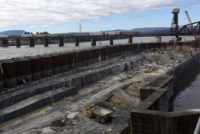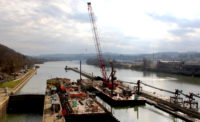Water Infrastructure
White House Plan Would Break Up Corps Civil-Works Functions
Proposal is one of many organizational changes sought by Trump administration

Plan would shift Corps responsibilities for building and operating navigation infrastructure, such as Mononghela River Locks and Dam #3 (above). Photo courtesy of U.S. Army Corps of Engineers Pittsburgh District
As part of a sweeping federal government reorganization proposal, the White House has recommended shifting the Army Corps of Engineers’ civil-works operation to the Dept. of Transportation and the Dept. of the Interior.
The Trump administration proposal, which the Office of Management and Budget unveiled on June 21, has many provisions that would require approval by Congress, including the envisioned breakup of Corps nonmilitary duties. Although some House members have advocated moving Corps civil works out of its long-time home at the Dept. of Defense, that proposal would face a long, difficult path on Capitol Hill.
Under the proposal, the Corps’ activities related to commercial navigation, which include designing, building and operating river locks and dams and seaport dredging, would be transferred to DOT.
For one thing, says Associated General Contractors of America spokesman Brian Turmail, "Politically, it is unclear how much appetite Congress has to undertake major structural changes between now and the election."
Sen. Tom Carper (Del.), the top Democrat on the Environment and Public Works Committee, said in an emailed statement, “I am always open to ways in which we can make our government more efficient, but I’m not sure that moving the Army Corps Civil Works Division in its entirety out of the Dept. of Defense accomplishes that."
Carper added, "I’m concerned that it might be counterproductive to move a division charged with strengthening our Nation’s water infrastructure—which is critical to our national security—out of an agency that is also charged with assisting in responding to disasters that tend to hit this same infrastructure."
Under the proposal, the Corps’ activities related to commercial navigation, which include designing, building and operating river locks and dams and seaport dredging, would be transferred to DOT.
The OMB report states that the shift “would consolidate responsibility across all transportation modes within a single federal agency, thereby encouraging consistent federal policy in the transportation sector.”
All other Corps operations, including permitting and other regulations, as well as flood control and ecosystem restoration, would shift to Interior.
The OMB report says that under the proposed change, the "Executive Branch could better direct its ecosystem restoration investments to achieve the greatest benefit to fish, wildlife and their habitat, and better leverage the expertise and relationships [Interior] maintains with state fish and wildlife agencies."
The report also contends that moving to Interior such Corps tasks as issuing Clean Water Act permits to dredge and fill tracts near wetlands and other bodies of water “would produce administrative efficiencies and opportunities for simplified interaction with stakeholders.”
But one industry source, who requested anonymity to speak candidly, says, "I don't believe transferring the permit program to another different federal agency is going to make any difference at all."
The source acknowledges that the Corps is "far from perfect, but I don't think it improves by breaking it into pieces and sending [them] to other agencies."
The National Waterways Conference noted in a statement that most Corps water projects have multiple purposes, such as improving freight transportation and protecting local ecosystems, and observed that multi-purpose projects can produce conflicts between various interests.
The group contended, "Keeping appropriate federal activities in water resources consolidated within a single agency offers an opportunity to optimize these competing interests, allows federal responsibilities for water to be properly coordinated with those at state and local levels, and protects the multiple benefits produced from the water resources projects."
Les Edelman, senior counsel with water-resources consulting firm Dawson & Associates, notes that over the years the Corps has mobilized to play an important military support role, in areas such as Iraq and Afghanistan and has been on the ground cleaning up after natural disasters.
Edelman, a former Corps chief counsel, says that what's missing from the OMB report is "the concept of what the Corps does, what it is...that brings together in time of need, whether it be a disaster or military situation, an organization that's ready to go and just go to work."
He notes that a transfer of Corps civil-works functions has been proposed multiple times in the past but never adopted. He doesn't think it will fly this time. "But it's pretty difficult to make a forecast with this Congress," he adds. "I honestly don't think it's going to happen, but I worry about it every time it comes up."
Other Ideas for Change
Some congressional lawmakers, notably House Transportation and Infrastructure Committee Chairman Bill Shuster (R-Pa.), have raised the idea of transferring Corps civil works out of DOD, in part due to unhappiness about the pace at which the Corps studies and carries out water projects.
Those issues have led to provisions in pending House and Senate water-resources bills calling for a study of the Corps, including its structure. But the bills stop short of mandating a structural change.
The administration's overall reorganization plan has other controversial recommendations, such as merging the Education and Labor Departments.



